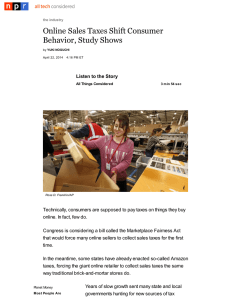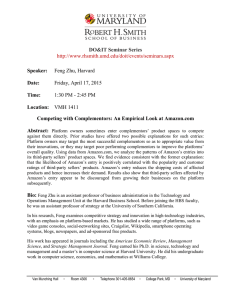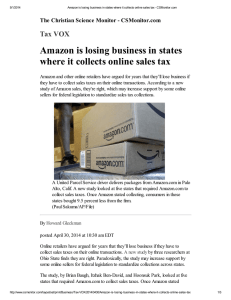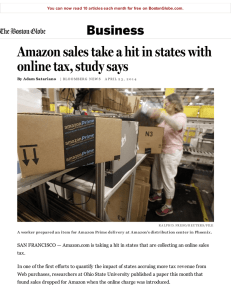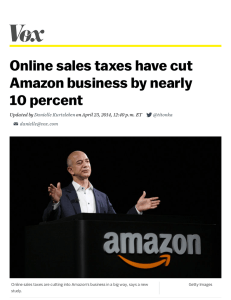Big Ideas: On Internet taxes, equal opportunity and citizenship
advertisement
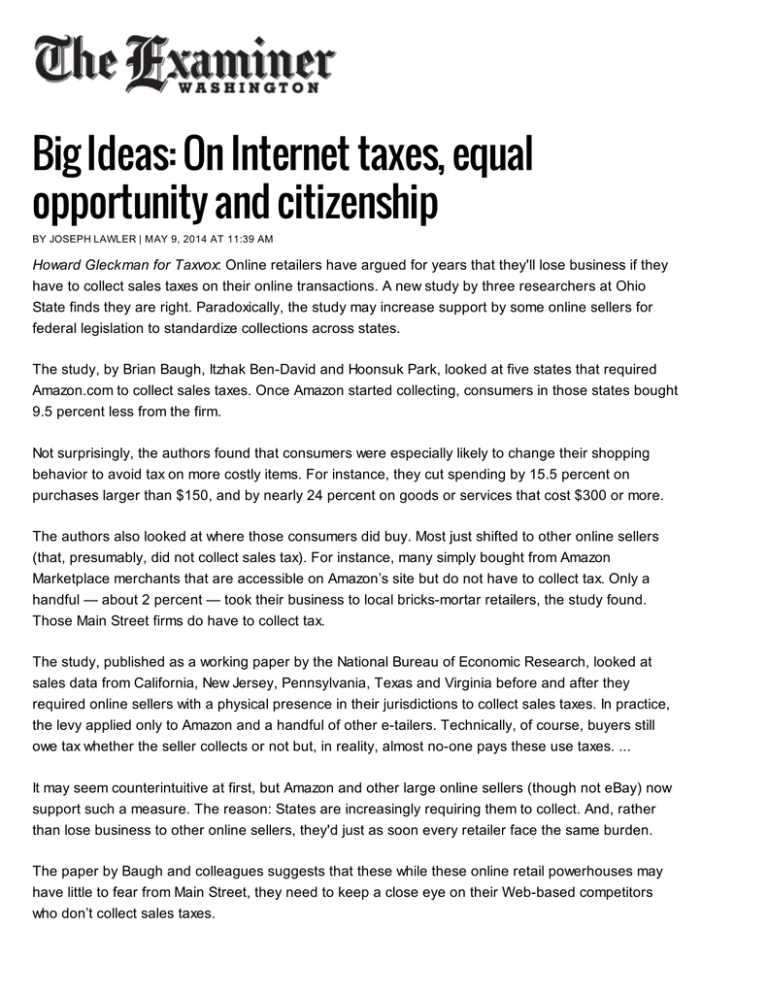
Big Ideas: On Internet taxes, equal opportunity and citizenship BY JOSEPH LAWLER | MAY 9, 2014 AT 11:39 AM Howard Gleckman for Taxvox: Online retailers have argued for years that they'll lose business if they have to collect sales taxes on their online transactions. A new study by three researchers at Ohio State finds they are right. Paradoxically, the study may increase support by some online sellers for federal legislation to standardize collections across states. The study, by Brian Baugh, Itzhak Ben-David and Hoonsuk Park, looked at five states that required Amazon.com to collect sales taxes. Once Amazon started collecting, consumers in those states bought 9.5 percent less from the firm. Not surprisingly, the authors found that consumers were especially likely to change their shopping behavior to avoid tax on more costly items. For instance, they cut spending by 15.5 percent on purchases larger than $150, and by nearly 24 percent on goods or services that cost $300 or more. The authors also looked at where those consumers did buy. Most just shifted to other online sellers (that, presumably, did not collect sales tax). For instance, many simply bought from Amazon Marketplace merchants that are accessible on Amazon’s site but do not have to collect tax. Only a handful — about 2 percent — took their business to local bricks-mortar retailers, the study found. Those Main Street firms do have to collect tax. The study, published as a working paper by the National Bureau of Economic Research, looked at sales data from California, New Jersey, Pennsylvania, Texas and Virginia before and after they required online sellers with a physical presence in their jurisdictions to collect sales taxes. In practice, the levy applied only to Amazon and a handful of other e-tailers. Technically, of course, buyers still owe tax whether the seller collects or not but, in reality, almost no-one pays these use taxes. ... It may seem counterintuitive at first, but Amazon and other large online sellers (though not eBay) now support such a measure. The reason: States are increasingly requiring them to collect. And, rather than lose business to other online sellers, they'd just as soon every retailer face the same burden. The paper by Baugh and colleagues suggests that these while these online retail powerhouses may have little to fear from Main Street, they need to keep a close eye on their Web-based competitors who don’t collect sales taxes. THE TRUTH ABOUT EQUAL OPPORTUNITY Joseph Fishkin for the Brookings Institution: Equal opportunity: a near-universally beloved idea, among people of many political persuasions. To be sure, we don't all agree on its contours or implications. Those who favor affirmative action and those who oppose it point to equal opportunity as their lodestar of fairness. But we need to be clear: Equal opportunity cannot actually be achieved. Three reasons equal opportunity is impossible: • The family. Parents are free to make decisions about how to raise their children. Not everyone has the same resources -- and even if resources were much closer to equal, not everyone has the same approach to parenting. So opportunities are going to be deeply unequal from day one. • Merit is always, in part, past advantage. Sometimes the idea of equal opportunity is focused on what happens later in life, aiming for meritocracy in the allocation of, say, coveted college places or jobs. But “merit” is elusive. There's no way to disentangle our true, underlying merit from the accumulated results of our past interactions with opportunities and advantages. • We’re all different. We have different goals. The same opportunities that are valuable to me may seem pointless to you. Moreover, because we’re different, I may need different opportunities to develop and grow than you need. Suppose I need glasses to see the blackboard, or an aide to enable me to participate in the class. When exactly are opportunities “equal?” HIT THE ROAD, TAX William McBride for the Tax Foundation: Not only are the corporations leaving, American citizens are, too. In both cases, it is taxes that are driving them away. The Treasury Department announced this week that 1,001 Americans renounced their citizenship in the first quarter of this year. That's more than the total renouncements in 2012 and about one-third of the renouncements in 2013. So far 2014 is on track to be another record year. According to international tax attorney Andrew Mitchel, there are three main causes: 1. Increased awareness of the obligation to file U.S. tax returns by U.S. citizens and U.S. tax residents living outside the U.S.; 2. The ever-increasing burden of complying with U.S. tax laws; and 3. The fear generated by the potentially bankrupting penalties for failure to file U.S. tax returns when an individual holds substantial non-U.S. assets.


